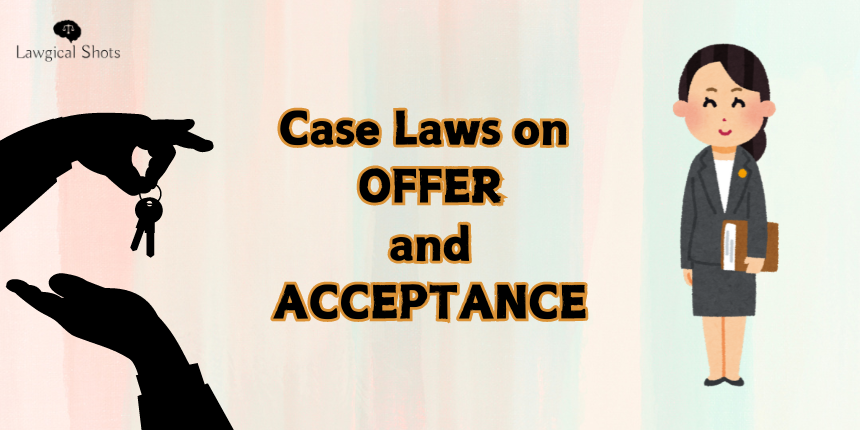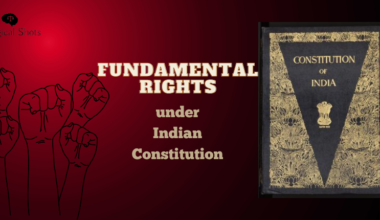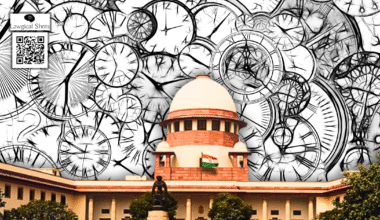Dear reader, if we tell you that this blog is paid, and that you agree to pay Rs 1000 if you scroll down, are you bound by this? When do you say an offer is accepted? When do contractual obligations come into play? The concept may be confusing based on specific facts. Because unless there is express offer and acceptance, there are instances like counter offer, or acceptance by post, whether considered at the time it was sent or received. To clear such clouds, Courts have to take the charge. The blog here contains a compilation of landmark case laws on offer and acceptance. Have a look at the facts to understand why the Court held in a certain way while defining what constitutes an offer and when acceptance is complete.
Case Laws on Offer and Acceptance
- Lalman Shukla v. Gauri Datt
Factual Background – The defendant’s minor nephew went missing and he sent some of his employees to find him, plaintiff was one of them. He gave some money and also paid for the travel expenses. After the petitioner was gone, the defendant also issued hand-bills offering a certain reward to anyone who would bring his nephew back. The plaintiff found the nephew and brought him back. The plaintiff was given some rewards and continued with his job without any complaint. Later, he claimed that he was entitled to the reward promised in the hand-bills for finding the defendant’s nephew.
Held – The Court said that the offeree should be aware of the offer and acceptance of the same should be communicated. In the instant case, the general offer of reward was made after the plaintiff left to find the defendant’s nephew. Since the plaintiff was performing his duty to find his employer’s nephew, he could not claim the reward. Thus, the Allahabad High Court dismissed the petitioner’s appeal.
- Harvey v. Facey
Factual Background – The case law on offer and acceptance involved a dispute regarding sale of a property owned by Facey which Harvey was interested in purchasing. Harvey showed his willingness through a telegram asking if Facey was willing to sell Bumper Hall Pen and its lowest cash price. Facey reverted through telegram saying “Lowest price for Bumper Hall Pen 900 pounds”. Harvey sent another telegram stating “We agree to buy Bumper Hall Pen for the sum of 900 pounds asked by you”. In the meantime, Facey sold the said property to another. Harvey sued Facey alleging that there was a contract between the two as agreed by Harvey at the price quoted by Facey.
Held – The Privy Council held that no binding contract existed between Harvey and Facey. It clarified that Facey’s initial telegram was an invitation to treat and not an offer to be accepted by Harvey. The Court ruled for the need to have a definite offer depicting the intention to be legally binding, in order to constitute a valid contract.
- Carlill v Carbolic Smoke Ball Company
Factual Background – This was an interesting case law on offer and acceptance wherein a company claimed that anyone who was consuming their medicine as per prescription would not contract influenza. They also offered through an advertisement a reward of 100 pounds to anyone who had contracted influenza to defy their claims. They even showed in the said advertisement to have deposited the said amount in the bank to show their sincerity. The plaintiff used the same as per directions and caught the flu within 3 weeks. However, her claim for reward was dismissed by the company stating that it was a sales puff lacking any sense of responsibility or agreement, and not a formal promise.
Held – The Court held that generally, such acts indeed are a sales puff and not intended to create a contract with the potential buyers. However, the part where the company even showed their sincerity by depositing the said amount with the bank, the woman would be entitled to the reward sum of 100 pounds. .
- Harris v. Nickerson
Factual Background – The defendant, an auctioneer, advertised about holding an auction for office furniture and other materials on 3 days as specified. The plaintiff attended the auction on Day 3, however, the auction was withdrawn on the said day. The plaintiff sued the auctioneer seeking compensation for the time wasted for attending the said auction.
Held – The Court held that the auctioneer’s advertisement was a mere declaration informing the potential clients of the auction, and was not an offer to contract. It was not even a warranty to put on sale all the materials advertised. The Court clarified that the said advertisement did not legally bind the defendant auctioneer.
- Ramsgate Victoria Hotel v Montefiore
Factual Background – The case laws on offer and acceptance pertains to the defendant who showed interest in buying some shares of the plaintiff hotel and also deposited a certain amount in their account. Six months passed and the hotel did not show any intention to carry out the contract nor communicated anything about the same. After 6 months, the defendant received a letter of acceptance from the hotel. By now, the value of the hotel’s shares had dropped and the defendant was no longer interested in buying them. However, the hotel initiated proceedings for specific performance of the contract.
Held – The Court held that the acceptance by the hotel should have been made within reasonable time. With no communication and a lapse of 6 months after the offer was made, the said offer had automatically expired. Thus, the defendant was no longer obliged to carry out the specific performance of the contract.
- Hyde v. Wrench
Factual Background – The landmark case on offer and acceptance pertains to offer and counter offer. Initially, Wrench offered to sell his farm to Hyde for 1200 pounds, which was declined by Hyde. Wrench brought another offer to sell the said property for 1000 pounds, and made it clear that this was his final offer. Hyde rejected the same and offered to buy the said property for 950 pounds. Wrench did not agree, which made Hyde to show his willingness to buy the farm for 1000 pounds as previously offered by Wrench. However, Wrench refused to sell the farm this time. On this, Hyde sued Wrench for specific performance of the contract.
Held – The Court dismissed the suit stating that there was no contract between the parties. The Court clarified that when a counter offer was made, it superseded and defeated the original offer. Thus, there was no contract made between Hyde and Wrench.
- Powell v. Lee
Factual Background – Powell, the plaintiff herein, was one of the candidates to be considered for the post of headmaster by the appointing authority. The board while considering his candidature internally held discussions selecting him for the post of headmaster. One of the members who overheard this discussion informed Powell regarding his selection. However, there was no formal communication till now. Later, Powell’s candidature was rejected and the same was formally informed to him. Powell went on to challenge this decision claiming that he was selected and there was breach of contract.
Held – The Court held that since the acceptance of his candidature was never formally informed, thus, there was no contract, and resultantly, there could be no breach of contract. When Powell applied for the post of headmaster, it was his offer, and it was upto the board to select or reject the same. Since the final decision of rejection was the only communication made, there was no breach at all.
- Bhagwandas v. Girdhari Lal
Factual Background – In this case law on offer and acceptance, Bhagwandas’ company agreed to sell cotton seed cakes to Girdharilal’s company over telephone. However, despite acceptance of offer, there was failure in delivery of the same which led to filing of civil suit. Jurisdiction for filing the said suit was questioned, one pleading that the place where the goods were to be supplied was the place of jurisdiction, while the other party said that the place where the acceptance was made over telephone was the place of jurisdiction, since the contract came into existence then and there.
Held – The Court held that in cases of instantaneous transmission, the place of acceptance determines jurisdiction. The Court further clarified that the contract is formed when the offeror learns about the acceptance being made.
- Adams v. Lindsell
Factual Background – In this case on offer and acceptance, Lindsell wrote a letter to Adams to sell a certain quantity of wool. Due to error in addressing the same, the letter reached Adams with a delay of 3 days. Adams in turn accepted the said offer by post, but the letter again faced a delay of 4 days. Meanwhile, the postal delays led Lindsell to sell the said wool to someone else, believing that there was no acceptance on part of Adams. This episode led Adams to sue Lindsell for breach of contract.
Held – The Court held that formation of contract took place when the acceptance letter was posted by Adams, and not when Lindsell received the same. Postal service was a reasonable means of communication, and was valid enough. Thus, the Court held that Lindsell could not revoke the offer.
- Bank of India v. OP Swarankar
Factual Background – The matter revolves around a Voluntary Retirement Scheme introduced in Nationalised banks. More than 1 lakh employees applied for the same and almost 2000 withdrew their applications. The withdrawn applications were accepted and the scheme was challenged in a writ petition. There was a clause in the application stating that the same could not be withdrawn once offered by the employees.
Held – The Court stated about the conscious decision of appellants to be abided by the terms and conditions of the application for VRS. The VRS was an invitation to treat, while the application was an offer made by the applicants and thus, were bound by the terms of the same.
- Tinn v. Hoffman
Factual Background – This was an interesting case law on counter-offer. Tinn sent a letter to Hoffman indicating his willingness to sell 800 tonnes of iron at the rate of 89sh per ton. Coincidentally, at the same time, Hoffman sent another letter to Tinn showing similar will echoing alike terms and conditions. The two letters crossed each other. Later, Tinn refused to supply the iron. Hoffman challenged the same stating that since there were similar terms in the two letters, his letter was an acceptance only.
Held – The Court held that the two letters contained offers only, and none of them was accepted. It was clarified that Hoffman could not accept an offer which he had no knowledge about. Thus, there was no formation of contract in this course of simultaneous action.








